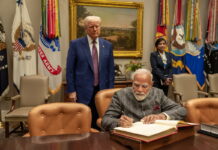The Chief Minister of India’s Uttar Pradesh, Yogi Adityanath, on occasion of the World Population Day, unveiled a policy for 2021-2030, aimed at stabilizing the population in Uttar Pradesh, reducing maternal and infant deaths in a time-bound manner, as he termed rising population a “hurdle in development.”
The policy is aimed to control population to promote sustainable development with more equitable distribution of resources. The BJP government of the state has floated a proposal to disincentivise couples from having more than two children and reward those who have only one child.
Such policies initiated in several States like Haryana, Andhra Pradesh, Madhya Pradesh, Rajasthan, Chhattisgarh and Odisha, have been denounced in the past by the country’s National Human Rights Commission. On the face of it, the new Bill, with its rationale and most of its provisions, sounds reasonable, what makes it suspect is the timing; when the government is already in election mode. The suspicion being voiced is the Bill is a ploy to create a Hindu-Muslim controversy, which by now is a tried-and-tested, polarizing, election-winning formula.
Improvement of health and family planning services is the obvious thing that should have been addressed a long time ago. Despite obstacles, Muslim adoption of family planning has been surprisingly high over last three decades — in fact higher than Hindus. Experience worldwide demonstrates such population control measures are always counterproductive. For example China, where a one-child policy had been in force since Mao’s regime; with its rising economic growth, China now faces shortage of manpower and with an increasing aging population had to adopt two-child policy recently.
The population policy cannot target any one religious community merely for benefit of elections, which are due in 2024. Don’t Hindus have more than two children? There is no doubt UP and Bihar where literacy rate is very low and are over populated, successive governments have repeatedly failed to bring development and especially to areas where minorities live. Most of the Muslim dominant areas are underdeveloped, such as Mewat in Haryana and many other states. These areas are often locally referred to as “mini-Pakistan”. In many instances, these are without basic amenities like water, primary education, healthcare facilities and see high unemployment rates. These factors lead to over population, anti-social activities and create conducive conditions for breeding ground of terrorism.
Myanmar although being an under developed country, never had to bring such a quick-fix policy for population control, mainly because of its high literacy rate. Sanjay Gandhi, during India’s emergency years in mid-1970s, attempted forced sterilization to fix population growth but failed terribly. Such policies may sound good and meet the immediate requirement for certain temporary gains but in the long-term fail to achieve their goals.
To tackle its population growth, India must take its education policy on a war footing and make sure it reaches every nook and cranny of the country. Modi has done a notable job with regards the Swachh Bharat campaign nationwide. Similarly, population control policies must be national rather than State level plans.







